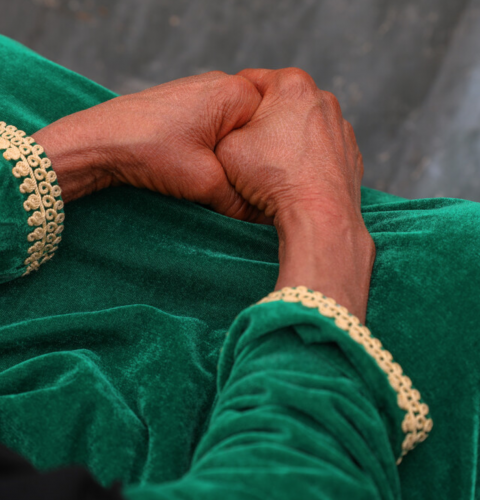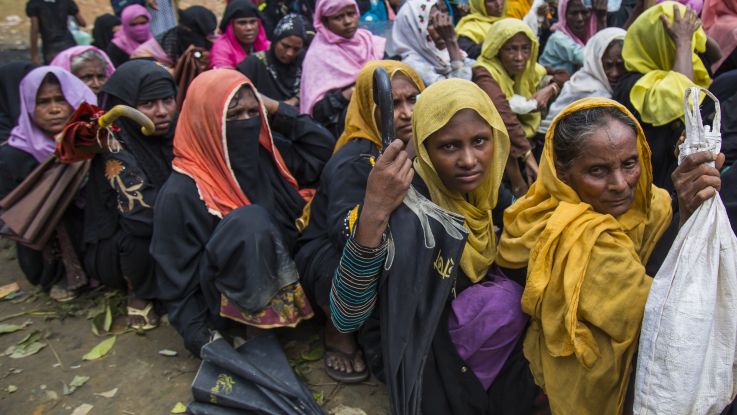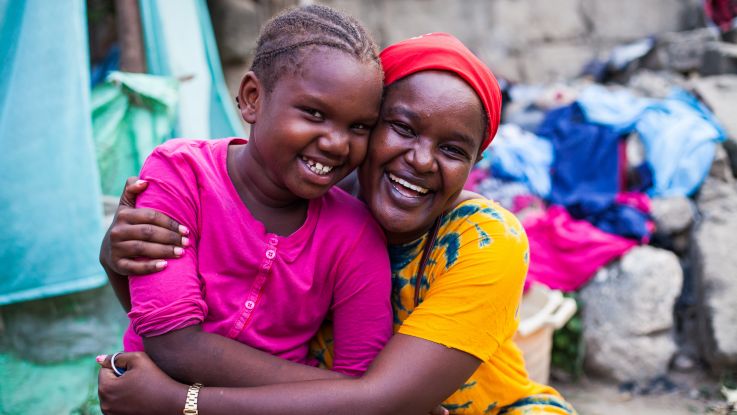Rape and sexual assault
150 million
The World Health Organisation estimates that 150 million girls are sexually assaulted every year.3
1/10
One in 10 girls under 20 (120 million) have been subjected to forced sexual intercourse or other forced sexual acts at some point in their lives.4
10 million
An estimated 10 million children are involved in child prostitution around the world.5
Rape as a form of violence of women and girls
Rape, like all forms of violence against women and girls, is a gross violation of human rights, is a result of deep gender inequality, and also perpetuates that inequality.
Due to its invasive sexual nature, rape is especially traumatising; it can cause deep physical, emotional and psychological trauma for years to come, it increases the risk of women and girls being infected with HIV, and it can have devastating effects on their family and community too.
Rape and sexual assault is an expression of some men and boys perceiving women’s bodies as objects that they can dominate and use. This perception is influenced and reinforced by the way that the female body and femininity is constucted by society and the law.
Patriarchal attitudes mean that women’s and girls’ bodies are less likely to be presented as being human. This denies women and girls their right to bodily integrity and means they are more vulnerable to abuse by those who benefit from patriarchy. The female body acts as a site where power is played out.
ActionAid provides rape survivors with counselling and practical support, and prepares communities with information on what to do to when someone is raped in order to seek justice. We also support communities in campaigning to end all forms of violence against women and girls. Read about our Theory of Change for tackling violence against women and girls.
Rape and sexual violence against children
UNICEF estimates that around 120 million girls worldwide (slightly more than 1 in 10) have experienced forced intercourse or other forced sexual acts at some point in their lives.7
Boys experience sexual violence too, but to a far lesser extent than girls, UNICEF studies show.8
By far the most common perpetrators of sexual violence against girls are intimate partners. In many countries, particularly in Sub-Saharan Africa, this is normalised and legitimised by child marriage – a socially accepted form of sexual violence, exploitation and abuse against girls. If the perpetrator had had sex with the girl prior to the ‘marriage’ taking place, it would be regarded as rape.
Experiences of sexual violence in childhood hinder all aspects of development: physical, psychological/emotional and social.
Apart from the physical injuries that can result, sexual abuse of children is associated with a wide array of mental health consequences and adverse behavioural outcomes in adulthood.9 The psychological impact can be severe due to the intense shame, secrecy and stigma that tend to accompany it.
It can lead to early pregnancy (in cases of rape) as well as greater risks of experiencing domestic violence by intimate partners.10
Rape and sexual assault of women and girls by non-intimate partners is also rife – such as by an uncle, neighbour, or stranger. In some areas where ActionAid works in Kenya, for example, girls as young as two years old have been raped, often by family members, with devastating consequences.
ActionAid supports local community groups to raise awareness about rape and sexual violence and prepare family members to know what to do.
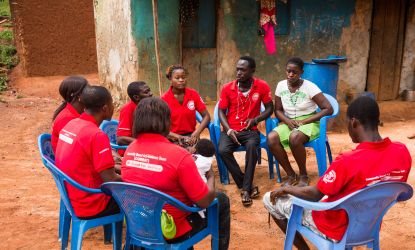
COMBAT members in Brong Ahafo Region, Ghana, who help to prevent rape and child marriage
Nana Kofi Acquah/ActionAid
Janet's story of rape
Janet was just 11 years old when she was raped by a neighbour in their village in Ghana.
Her family reacted swiftly to report the incident to the police, as a result of the awareness work done by ActionAid COMBAT squads – Community-Based Anti-violence Teams.
“It happened one evening," Janet described. "We often went to watch a movie at this neighbours’ house. Usually we went together, but that night I was alone."
He locked the door and turned the TV set up loudly. Then he started to rape me."
"I shouted and shouted but nobody heard me because the TV was so loud. Since it happened my friends mock me, they don’t want to associate with me. It sometimes makes me feel sad and lonely."
Janet's father rushed her to the police station and then to hospital. Her wounds took months to heal.
Ankomi, Janet’s father, said: “All this time the COMBAT squad supported our family. I heard of COMBAT last year. I saw a video on domestic violence in the street and learnt what to do. It gave me courage to take my daughter's case to the police. Before COMBAT started working in this village there was a lot more violence. It is definitely reducing.”
Janet said: “I’m glad to be back at school. I’m doing well. Maybe I’ll become a COMBAT member in the future. I want to be an example."
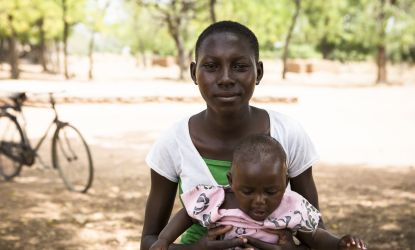
Rainar's story: coerced into sex in exchange for rice
Rainar, 18, lives in a village in Upper West state, in Northern Ghana, one of the poorest areas of the country.
She was made pregnant by a local boy who coerced her into sex after offering her a meal of rice.
She now has a five month old son and the boy, who is thought to be around 18 years old too, has not continued his relationship with her.
She occasionally gets 50 Ghanian cedis from him or some greens from his parents.
ActionAid works closely with the local village chief and community leaders to raise awareness about girls' rights and to reduce rape, sexual violence, and teenage pregnancy.
Rainar, 18, with her five-month-old son in Ghana
Ruth McDowall/ActionAid
Sexual violence in humanitarian crises
Violence against women and girls increases during all emergencies. Throughout all humanitarian crises, whether an earthquake, a drought or a conflict, many forms of violence against women and girls take place at an increased rate.
Displacement causes disruption and movement, and former systems which would have protected women may have broken down.
In the early phases of an emergency, sexual violence is the most common form of violence recorded. As the crises moves on, other forms of violence – such as domestic violence and child marriage – may also increase.
Rape as a weapon of war
In 2008, General Patrick Cammaert, a former deputy Force Commander of the United Nations Organisation Mission in the Democratic Republic of the Congo (MONUC) stated that:
It has probably become more dangerous to be a woman than a soldier in contemporary conflicts.”11
He said that the sexual violence he witnessed in Eastern Congo was among the worst atrocities he had ever seen in over thirty years of military service. Since 2008, humanitarian practitioners have started to understand that these human rights atrocities go beyond women – and affect the entire population.
Throughout history, women and girls have been targeted with rape and sexual violence at the hands of military and rebel forces as a weapon of war – from the 1994 Rwandan genocide where between 250,000 and 500,000 women were raped12 to the current Rohingya refugee crisis where widespread rape of women and girls, and other atrocities, have forced hundreds of thousands of people to flee Myanmar.
Rape is used as a weapon of war to either wipe out, disperse or forcibly relocate people from a particular community or ethnic group. When used to forcibly impregnate women, it is akin to ethnic cleansing.
ActionAid helps survivors of sexual violence through setting up women’s safe spaces where women can share their experiences and access vital information, psychosocial support, and medical referrals if needed.
We train women in leadership skills so that they are better equipped to lead their communities — in times of crisis and beyond, and support them in their vital role in peace movements at grassroots levels.
Corrective rape
Corrective rape is a form of homophobic violence where men rape women in order to punish and 'cure' them of their lesbianism.
There is evidence of this form of violence occuring in countries such as South Africa (pdf), where in some cases an oppressive and mysoginistic culture has led to forced gender stereotypes, and a backlash of crimes against lesbian women, who are perceived as representing a direct and specific threat to the status quo.
A report by South Africa’s Human Rights Commission expressed alarm at the “growing phenomenon of ‘corrective’ rape” in schools across the country, with young boys believing that lesbian girls need to be raped in order to ‘correct’ their sexual orientation.13
This brutal form of violence is often racialised. Research has shown that while 44% of white lesbians from South Africa's Western Cape lived in fear of sexual assault, 86% of their black counterparts felt the same.14
Together with partner organisations in South Africa and around the world, ActionAid works to an end to corrective rape, support survivors and pressure governments to hold the perpetrators of violence to justice.
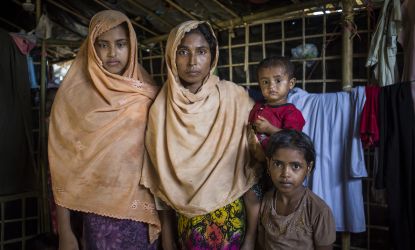
Amina, 33, with her children in their make-shift shelter where they are now living as refugees in Mainnerghona camp, Cox’s Bazar, Bangladesh
Noor Alam/ActionAid
Rape of Rohingya women and girls in Myanmar
Amina, 33, fled Rakhine state in Myanmar in fear of her life whilst heavily pregnant. She told us she knows of women who had been raped in the violence in Myanmar.
Now living as a refugee in Mainnerghona camp, Cox’s Bazar, in Bangladesh, she still fears for the safety of her young daughters, as her home is flimsy meaning young men could easily break in.
More than 655,000 people are in urgent need of humanitarian assistance after fleeing violence in Myanmar to seek safety in Bangladesh – the majority are women and children.
ActionAid has built a number of Women’s Safe Spaces in Cox’s Bazar – centres where women like Amina can breastfeed in private, receive hygiene kits, emotional support, and, where needed, access medical referrals.
We are working with women-led committees of refugees in the camps, to ensure the aid we provide is appropriate, meets the needs of women and girls and gets to the people who need it most.
Have you been affected by rape?
If you or anyone you know has experienced rape, there are services that can help. You don't have to report the assault to the police if you don't want to.
These services may be able to help you:
Rape Crisis – 0808 802 9999
A free national helpline for women and girls who have experienced abuse, rape and all forms of sexual violence.
24-hour National Domestic Violence Helpline - 0808 2000 247
A 24-hour national service for women experiencing domestic violence, as well as for their their family, friends, colleagues and others calling on their behalf.
Galop, the LGBT+ anti-violence charity
Support for LGTB+ women, men and non-binary people who have experienced hate crime, sexual violence or domestic abuse. They also have a dedicated service for trans people.
The Survivors Trust
Support for all survivors of rape, sexual violence and childhood sexual abuse, no matter how long ago it happened.
Childline - 0800 1111
Free help and advice to anyone under the age of 19.
Footnotes
- 1United Nations (2008). Unite to End Violence Against Women and Girls, Fact Sheet, p.1.
- 2United Nations Office for the Coordination of Humanitarian Affairs, United Nations High Commissioner for Refugees and International Rescue Committee (2012). Gender-Based Violence Classification Tool. 1st ed. [ebook] Gender-based Violence Information Management System Project.
- 3UNICEF (2006), Rights of the child, p.10.
- 4UNICEF (2014), Hidden in Plain Sight, A statistical analysis of violence against children, p.4.
- 5Centers for Disease Control and Prevention (2002), Child prostitution: global health burden, research needs, and interventions.
- 6ActionAid UK (2017), Common Cause, Collaborative Response: Violence against women and girls and sexual and reproductive health and rights, p.7.
- 7UNICEF (2014), Hidden in Plain Sight, A statistical analysis of violence against children, p.4.
- 8UNICEF (2014), Hidden in Plain Sight, A statistical analysis of violence against children, p.4.
- 9Brown, J., et al., ‘Child Abuse and Neglect: Specificity of effects on adolescent and young adult depression and suicidality’, Journal of the American Academy of Child and Adolescent Psychiatry, vol. 38, no. 12, 1999, pp. 190–196;
- 10Krahe, B., et al., ‘Childhood Sexual Abuse and Revictimization in Adolescence’, Child Abuse & Neglect, vol. 23, no. 4, 1999, pp. 383–394; Daigneaulta, I., et al., ‘Men’s and Women’s Childhood Sexual Abuse and Victimization in Adult Partner Relationships: A study of risk factors’, Child Abuse & Neglect, vol. 33, no. 9, 2009, pp. 638–647.
- 11Kvarving, Lena Lt Col (Ed.) Sexual Violence, The Armed Forces and Military Operations, Norwegian Defence University: Volume 1: Issue 3, p. 35.
- 12 UN Special Rapporteur to the Commission on Human Rights, ‘Report on the Situation of Human Rights in Rwanda’ (E/CN.4/1996/68) para 16.
- 13“Report of the Public Hearing on School-based violence” (2008), South African human rights commission P9
- 14“Levels of Empowerment Among LGBT People in the Western Cape, South Africa”, (2006) Triangle Project & UCAP, P30
Page updated 10 February 2025
